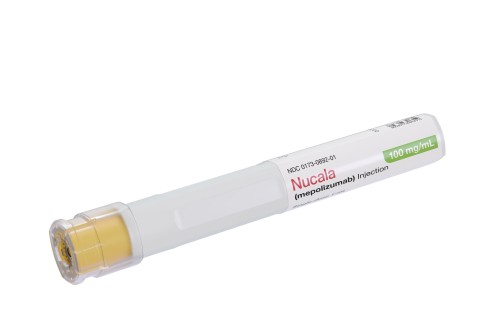
GlaxoSmithKline is eyeing another regulatory filing for its IL-5 inhibitor Nucala, after reporting positive phase 3 results with the drug in rare disease hypereosinophilic syndrome (HES).
The drugmaker says Nucala (mepolizumab) is the first treatment to show a significant reduction in ‘flares’ in HES, inflammatory attacks that can result in organ damage, including to the heart and lungs.
GSK is planning to file for approval of Nucala in HES next year, hoping to add to its currently-approved use in severe eosinophilic asthma and eosinophilic granulomatosis with polyangiitis (EGPA).
HES affects around 20,000 people worldwide and is characterised by excessive levels of eosinophils, white blood cells that drive inflammation, and is currently managed with corticosteroids and chemotherapy drugs, which can have serious side effects. If left untreated the condition can be life-threatening.
In the phase 3 study, add-on treatment with Nucala resulted in a 50% reduction in HES flares requiring an escalation in therapy compared to placebo over a 32-week study period, reducing the rate from 56% to 28%.
GSK’s drug also reduced the risk of a first HES flare by 66%, and there was also a 66% reduction in the annualised rate of flares compared to placebo. Rates of fatigue – a common symptom of HES – were also significantly reduced with Nucala.
Nucala has become an important growth product for GSK, growing 35% to £550m ($707m) in the first nine months of this year, driven in part by the roll-out of new auto-injector and pre-filled syringe formulations that have made its monthly administration easier.
GSK is trying to keep the first-to-market IL-5 inhibitor ahead of other drugs in the class, particularly AstraZeneca’s Fasenra (benralizumab) which is gaining ground fast with nine-month sales of $498m, an increase of 193%.
AZ’s drug has the advantage of being dosed every eight weeks, and the company is also working on an auto-injector version that could increase pressure on Nucala further.
Approval in HES could give Nucala another niche free from competition, for a while at least, as AZ’s drug is further back in development. Phase 2 data in HES were reported in June.
GSK suffered a big setback for its product last year however when the FDA rejected its application in chronic obstructive pulmonary disease (COPD).




